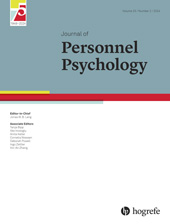Abstract
Zusammenfassung. Bisherige Untersuchungen fanden nur eine mäßige Validität von Selbstbeurteilungen (Validierungskriterium: Vorgesetztenbeurteilungen). Als eine Erklärung hierfür wird das oftmals begrenzte Ausmaß an Feedback über die eigene Leistung für die sich selbst beurteilende Person postuliert. Diese Erklärung wurde anhand einer Studie an N = 72 Geschäftsführern und deren Vorgesetzten (Vorstände) mittelständischer Unternehmen überprüft. In Übereinstimmung mit bisherigen Studien ergab sich ein geringer bis mäßiger Zusammenhang zwischen den beiden Urteilsquellen (r = .23; p < .05) und eine stärkere Korrelationstendenz (Halo-Effekt) sowie eine größere Varianz bei den Vorgesetztenurteilen. Als zentrales Ergebnis zeigte sich der erwartete Moderatoreffekt: bei überdurchschnittlich viel Feedback fiel die korrelative Übereinstimmung zwischen Selbst- und Vorgesetztenbeurteilung höher aus.
Abstract. Previous studies found only a moderate validity of self-ratings (criterion: supervisor ratings). We hypothesise that this can be explained by the often restricted amount of performance feedback for self-raters. This hypothesis was examined with a sample of 72 managers of medium-sized enterprises and their supervisors. In accordance with previous studies, a small to moderate correlation between self- and supervisor-ratings (r = .23; p < .05), stronger halo-effect and greater variance were found for supervisor ratings. Most importantly, results revealed that feedback moderated the relationship between self- and supervisor-ratings: managers who received more feedback showed higher congruence between self- and supervisor-ratings.
Literatur
(1989). Self-assessment in organizations: A literature review and integrative model. In L. L. Cummings & B. M. Staw (Eds.), Research in Organizational Behavior (Vol. 11, pp. 133-174). Greenwich, CT: JAI Press
(1986). The moderator-mediator variable distinction in social psychological research: Conceptual, strategic, and statistical considerations. Journal of Personality and Social Psychology , 51 , 1173– 1182
(1991). Congruence of self and others’ leadership ratings of naval officers for understanding successful performance. Applied Psychology: An International Review , 40 , 437– 454
(1995). On the interchangeability of objective and subjective measures of employee performance: A meta-analysis. Personnel Psychology , 48 , 587– 605
(2003). Applied multiple regression/correlation analysis for the behavioral sciences . Hillsdale, NJ: Erlbaum
(1997). Psychometric properties of multisource performance ratings: A meta-analysis of subordinate, supervisor, peer, and self-ratings. Human Performance , 10 , 331– 360
(1989). Effects of comparative performance information on the accuracy of self-ratings and agreement between self- and supervisor ratings. Journal of Applied Psychology , 74 , 606– 610
(2000). Self-management training for improving job performance: A field experiment involving salespeople. Journal of Applied Psychology , 85 , 361– 372
(1994). Congruence of self and subordinate ratings of managerial practices as a correlate of supervisor evaluation.. Journal of Occupational and Organizational Psychology , 67 , 57– 67
(1993). The impact of 360°-degree feedback on management skills development. Human Resource Management , 32 , 325– 351
(1988). A meta-analysis of self-supervisor, self-peer, and peer-supervisor ratings. Personnel Psychology , 41 , 43– 62
(2002). Meta-analysis of self-supervisory performance ratings . Poster beim 43. Kongress der DGPs, Berlin
(2001). Cultural differences in self-evaluation. Japanese readily accept negative self-relevant information. Journal of Cross-Cultural Psychology , 32 , 434– 443
(1983). The measurement of work performance: Methods, theory, and applications . New York, NY: Academic Press
(1995). Can multi-source feedback change perceptions of goal accomplishment, self-evaluations, and performance-related outcomes? Theory-based applications and directions for research. Personnel Psychology , 48 , 801– 839
(1991). Agreement between subordinate and self-ratings in upward feedback. Personnel Psychology , 44 , 375– 390
(1982). Validity of self-evaluation of ability: A review and meta-analysis. Journal of Applied Psychology , 67 , 280– 296
(1994). Validität der Selbstbeurteilung beruflicher Leistung: Eine Untersuchung im Bereich industrieller Forschung und Entwicklung. Zeitschrift für Experimentelle und Angewandte Psychologie , 41 , 474– 500
(1999). Selbstbeurteilung beruflicher Leistung. Überblick und offene Fragen. Psychologische Rundschau , 50 , 14– 25
(2004). Selbstbeurteilung. In H. Schuler (Hrsg.), Beurteilung und Förderung beruflicher Leistung (S. 83-99). Göttingen: Hogrefe
(1995). Understanding performance appraisal . Thousand Oaks, CA: Sage
(1998). SIMPLE: All-in-one programs for exploring interactions in moderated multiple regression. Educational and Psychological Measurement , 58 , 833– 837
(1992). Agreement between subordinate and superior ratings of supervisory performance and effects on self and subordinate job satisfaction. Journal of Occupational and Organizational Psychology , 65 , 151– 158
(2003). 360-Grad-Beurteilungen. Diagnose und Entwicklung von Führungskompetenzen . Göttingen: Hogrefe
(1985). Ein Verfahren zur Diagnose von Arbeitsinhalten: Der Job Diagnostic Survey (JDS). Zeitschrift für Arbeits- und Organisationspsychologie , 29 , 162– 172
(1984). Self-appraisal based upon supervisory feedback. Personnel Psychology , 37 , 667– 685
(1992). The effects of perceived system knowledge on the agreement between self-ratings and supervisor ratings. Personnel Psychology , 45 , 835– 847
(2000). Self-supervisor agreement: The influence of feedback seeking on the relationship between self and supervisor ratings of performance. Journal of Applied Social Psychology , 30 , 275– 292
(1999). Ergebnisbericht zur Bewertung von ÜMV Seminaren: Evaluationsstudie zum Transfer von Seminarinhalten an den Arbeitsplatz. . Erlangen-Nürnberg: Lehrstuhl für Wirtschafts- und Sozialpsychologie, Friedrich-Alexander Universität



